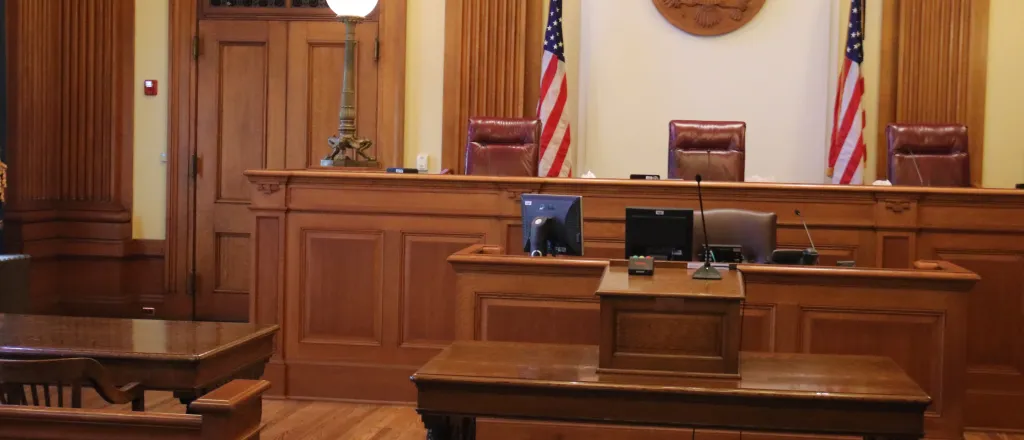
Attempts to make Montana judiciary partisan hit another roadblock
Despite Republican leaders’ pledge to reshape the judiciary in Montana, the Legislature doesn’t appear to have had the appetite to increase the partisanship of the state’s courts this session.
Monday, representatives voted down House Bill 838, a bill that would allow Montana Supreme Court candidates to indicate a political affiliation, on a 46-54 vote, with 12 Republicans joining all Democrats in repudiating the premise.
Last week two similar bills — Senate Bill 42 and Senate Bill 543 stalled in the House and Senate respectively.

Urging his caucus to support his bill, HB 838, Speaker of the House Brandon Ler, R-Savage, said he too would like an independent judiciary, but that doesn’t happen.
“The will of the voters was to send a strong conservative majority out here the past three sessions I’ve been in, and every good bill we run on the floor just seems to get shot down,” Ler said. “It’s time to make the judiciary reflect the will of the voters of Montana.”
In early January, Ler along with Senate President Matt Regier, R-Kalispell, outlined a plan for reigning in the co-equal branch of government.
A primary goal was to make judicial elections partisan. Many GOP lawmakers allege justices already have partisan leanings and the labels simply offer voters transparency. Republican Governor Greg Gianforte echoed this desire, repeatedly calling on lawmakers to send such a bill to his desk.
But with less than a month left in the 69th legislative session, lawmakers are 0-for-5 on passing bills aimed at removing the state’s nonpartisan elections for judges.
Several adjacent bills — one to reduce the number of Supreme Court judges, one to allow judicial candidates to take part in partisan events or hold positions in political organizations — have also failed to garner majority support.
So far, just one bill on the topic has made it to the governor’s desk. House Bill 39, now codified in Montana Code, allows political parties to contribute to the campaigns of judicial candidates. While HB 39 doesn’t attach a letter to a candidate’s name on the ballot, it opens the door for more money, and more clearly partisan money, to enter judicial races.
The final (for now) debate
The state of the partisan judiciary
- SB 42 — Requiring political affiliation in judicial races — Senate:✓House: X
- SB 543 — MT Supreme Court can indicate political affiliation — Senate: X
- HB 39 — Allow political parties to contribute to judicial candidates — House:✓ Senate:✓ Governor: ✓
- HB 169 — Allow judicial candidates take part in partisan activities — House:✓ Senate: X
- HB 295 — All judicial candidates can indicate political affiliation — House: X
- HB 506 — Constitutional amendment to appoint judges — Committee: X
- HB 751 — Requiring MT Supreme Court candidates indicate political party or be “undisclosed” — House: X
- HB 838 — MT Supreme Court can indicate political affiliation — House: X
Many lawmakers stood up on the debate for HB 838 Monday afternoon, with the longest speeches coming from those in opposition.
Opponents cited the clear desire from representatives, as seen in previous votes, to keep the courts as nonpartisan as possible, despite massive increases in spending in recent elections and the perceived slant of recent state Supreme Court decisions.
Others cited the slower turnover of the courts compared to other elected positions — state Supreme Court judges serve eight-year terms while representatives serve just two — and urged lawmakers to let the changes take their natural course.

“Montana recently switched from a purple state to a red state,” said Representative George Nikolakakos, R-Great Falls. “It takes time to lag behind and offer that counter balance. In many ways, that’s a feature of the system. As frustrating as it is, it’s not a bug. It ensures our courts are separated from the political passion of the day.”
But many Republicans backed the Speaker’s bill, using many of the same arguments made throughout this session-long debate. One of the primary cases made by proponents is that partisan affiliation is a voter-education tool.
“We have people coming to us to say, who should we vote for the judge? Because I’m not spending time coming out and not looking at the cases they heard,” said Representative Gary Parry, R-Colstrip. “If you think for a minute that the judges aren’t going with an ideology, I challenge that. I just don’t think that keeping the public uninformed about it is the way to go … (This bill) at least gives the voters an opportunity to make an informed choice.”
Several representatives said they would prefer to consider a different system altogether, namely letting the governor appoint justices with either Legislative confirmation or from a short list selected by a commission. More than half of states have some version of an appointment system for their highest courts.
A bill heard earlier this session would have asked Montana voters to consider a constitutional amendment to allow the governor to appoint Supreme Court justices from a slate selected by a bipartisan commission, but that proposal never made it past a committee hearing.
House Majority Leader Steve Fitzpatrick, R-Great Falls, said that as a lawyer, he looks for judges who are fair, follow the law and listen to attorneys. And during the last decade, he said he’s seen the system evolve further into partisanship and pushed his caucus to back the bill.
He said the partisan judicial bills are “simply a response to what’s going on.”
“If we want these bills to go away, I think it’s time for the judiciary to step up and make them go away,” he said.
Representative Jonathan Karlen, D-Missoula, said that while lawmakers ascribe to a partisan label in order to advocate for and push forward a party platform that they stand behind, judges have an altogether different job that doesn’t involve toeing a party line.
Adding judges directly into the partisan mix would have candidates for court echoing party lines, chasing endorsements and campaigning purely on ideology, he said.
“That’s not an impartial court,” Karlen said. “That’s legislators in red robes and blue robes.”
















